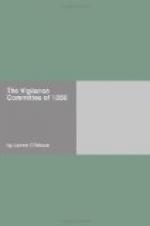Pistol Battalion — Two companies, commanded
respectively by Captains
Webb and E. S. Gibbs.
The roll of Division No. 4 is thus given:
J. A. Collins, Commander, Geo. G. Whitney, 1st Lieut.
W. H. Parker, 2d
L’t, J. H. Mallett, Orderly Sergeant, R. R.
H. Rogers, Second Orderly
Sergeant, Wm. H. Wood, Third Orderly Sergeant, Charles
D. Cushman,
Fourth Orderly Sergeant. Privates — D.
Morgan, Jr., P. G. Partridge,
John Burns, E. W. Travers. Giles H. Gray, Martin
Prag, John Wright,
James Wells, Jas. W. White, Judah Alden, Alfred Rix,
J. W. Farrington,
W. L. Waters, W. F. Hall, J. T. Bowers, J. L. N. Shepard,
Lucius Hoyt,
David Laville, H. A. Russell, E. Stevens, Theo.
B. Cunningham, M.
McMannis, Wm. H. Gibson, Edmund Keyes, George T. Bohen,
I. M. Bachelder,
R. T. Holmes, W. F. Shankland, B. Argyras, John R.
Chute, John S.
Davies, James McCeny, Geo. H. Tay, Sohn Bensley, L.
Bartlett, Joseph W.
Housley, Robert Wells, Samuel Fullerton, Newell Hosmer,
J. J. Lomax, G.
K. Fitch, Wm. Hayes, Robert A. Parker, Samuel Soule,
A. Wardwell, Isaac
E. Davis, M. McIntyre, F. E. Foote, Thomas A. Ayres,
William K.
Blanchard, J. F. Eaton, J. Frank Swift, J. O. Rountree.
These names of Secretaries of the Committees of the Executive Committee are added: On Evidence — J. H. Titcomb and D. McK Baker; on Qualification — E. T. Beals.
First, as to the cause or pretence for the organization of the Vigilance Committee: It is declared by its ex-members and supporters, or apologists, that it was necessary for the reason that the law was not duly administered; that the Courts, the fountains of justice, were either corrupted or neglectful of their duties; that Juries were packed with unworthy men in important criminal cases, that there were gross frauds in elections, by which the will of the people was defied and defeated, and improper and dishonest men, some of them notorious rogues, were counted in and installed in public office; and that there was a class of turbulent offenders who had the countenance, if not the support of judges and officials in high places, and who, therefore, felt themselves to be above or exempt from the law. Tennyson has well remarked that there is no lie so baneful as one which is half truth. So it is in respect to these alleged reasons for the organization of that Vigilance Committee. It is not true that the Courts were corrupt, neglectful or remiss. Judge Hager presided in the Fourth District Court, and his integrity and judicial qualifications, or judgments, have never been questioned or impeached. Judge Freelon presided as County judge; the same can be remarked of him. There was no material fault alleged against the Police Court. It is true, however, that in important criminal cases, and sometimes in civil suits, the juries were often packed. But why? I will state: Merchants and business men generally had great aversion to serve on juries,




